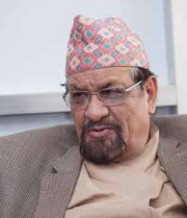
How to meet people’s rising aspirations with limited resources?
Firstly, could you elucidate Nepal’s current national economy and the financial situation?
With numerous problems, Nepal is one of the least developed countries. The income level here is low, but development and investment cost is high. Despite all these, we have been managing our economy in a satisfactory manner. Our overall macro situation and deficit is under control. Our debt level is low. We were able to maintain 5.2% growth in the last fiscal and expect to achieve 6% growth this year. However, due to the huge landslides and floods this year, the country’s agriculture may not yield as expected. Our main objective is to attract investment as much as possible to boost our export. Therefore, our major challenge at the moment is to promote export by inviting infrastructural investment, especially in hydro, agriculture and tourism.
What is your impression about Nepal Infrastructure Summit 2014 held on November 11-12?
The theme of the summit “Accelerating investment in infrastructure” was appropriate and timely. The government is giving high emphasis on infrastructure development. Nepal, as I said earlier, has numerous problems, including power shortage, poor road network, lack of international airports, and irrigation systems. The major objective of the conference on infrastructure development was to attract investment in these sectors. Fortunately, we received a positive and encouraging response.
Foreign aid is very important for Nepal. How about its utilization?
Implementation of projects is going on very well. Of course, some projects are not doing well. Actually, it depends on the situation, participation, commitment and the nature of the project. Some projects are delayed at the implementation level due to contractual problems, performance of contractors, and other factors. But as a whole, Nepal’s performance in foreign projects is improving.
Corruption is also a challenge. How does the government plan to rein in it?
Corruption is getting worse. The government is putting best efforts to address this problem. The anti-corruption body, CIAA, has been empowered with resources. This watch-dog has initiated action against the corrupts and financial irregularities. The Prime Minister has ‘zero tolerance’ policy against corruption, and the government will not tolerate any form of corruption.
What is the biggest challenge for you as finance minister?
The major challenge is how to meet the rising aspirations of Nepalis by utilizing limited resources. There is a huge challenge for development, to push the country into a higher growth trajectory. For this, you need to make huge investment from public and private sectors. Therefore, finding investable resources and good projects are some of the major issues.
What is your opinion on Asian Infrastructure Investment Bank (AIIB)?
Immediately after China announced its intention for AIIB, China’s Deputy Minister invited us. We instantly gave our consent and we are happy to be a part of it. We believe that it will help the integration of Asian economy and in tackling the problem of infrastructure deficiency. Since our infrastructural need is enormous, this bank will support financing projects. We are pleased that the bank will be operational by 2015 end.
Some people think that AIIB will challenge Asian Development Bank (ADB)?
I don’t believe there is any competition between these two banks. It is complementary more than competition. Asia needs huge investment in infrastructure projects. We have only one regional bank, which is not in a capacity to invest in the infrastructure. Therefore, if we can have another bank of similar size, it can be complementary. ADB is worried that the new bank may not observe the same level of good governance and safeguard environmental and other financial factors. But, we are fully assured that the new bank will maintain the internationally accepted standards.
What should be done to make the best use of Nepal’s strategic location?
Nepal is situated between the two huge economies with a population of about 2.7 billions. Both India and China are huge investment centers and we want to benefit from them through tourism and investment. For this, we need to develop our infrastructure. We also expect Indian and Chinese investors and a huge number of tourists coming to Nepal.
What are the reasons behind Nepal’s trade deficit?
We are not competitive. We have not exploited our hydro resources at their fullest. Once we develop our hydro potentiality, we will be in a position to export surplus energy, which will address our trade deficit. We have also not been able to promote tourism. Our export competitiveness is very low. We need to invite more investment, raise productive manpower, and adopt modern technology to produce goods and services.
(Mahat was the Finance Minister of Nepal under the government led by Sushil Koirala. He took over the office in February 2014. Prior to this, Mahat was Vice-Chairman of the National Planning Commission for three years. This interview was published on April 4, 2019)


